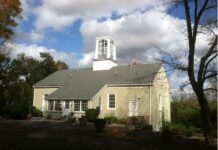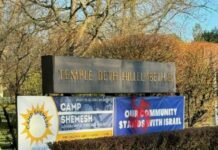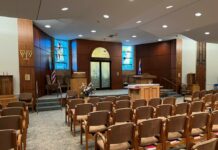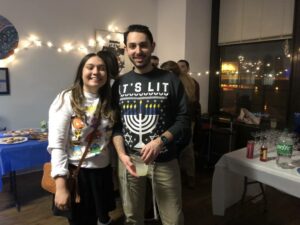
It’s not a stand-alone building on a big property. It’s just a suite in a Center City office complex.
When you walk in, you tell the front desk attendant that you’re looking for Mekor Habracha. He points you to the elevator and says, “Second floor.” And once you ride up, walk out and open the door, you see that there’s only room for a sanctuary, a playroom and a kitchen.
But that is all that the 180 members of this Orthodox congregation need.
Every Saturday morning, between 75 and 100 of them take that elevator ride to the second floor (the buttons are pushed for them). Most are in their 20s and 30s. Some are single.
As Rabbi Eliezer Hirsch leads the service from the front of the room, the women sit on one side and the men on the other. But they can look up and over and see each other. In a room across the hall, any children who need to come with their parents play together until the davening concludes.
After the service, the congregants go back down the elevator. But they do not disperse. Many of them sit for Sabbath lunch together, according to Ellen Geller, the synagogue’s treasurer.
“It feels great to see so many young people coming. It’s a vibrant community,” Geller said.
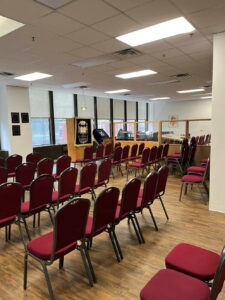
Mekor Habracha, also known as the Center City Synagogue, was once an independent havurah in Rittenhouse Square, according to mekorhabracha.org. In the 2000s, it became an informal prayer group with about 20 people within the larger Etz Chaim Center for Jewish Studies. Then in 2006, Hirsch arrived to formalize the community.
After Etz Chaim moved to the suburbs, Hirsch’s community remained. Mekor Habracha was born in 2007.
“We were unique in that we were the first Modern Orthodox, Ashkenazi synagogue (in Center City),” Geller said.
The Center City Synagogue’s congregants have always been “students, young professionals, newlyweds, families and empty nesters,” according to mekorhabracha.org. Together with Hirsch, they have helped bring a synagogue, a mikvah and more than 30 kosher restaurants to Center City.
“In terms of creating a young Jewish community in Center City, we played a central role,” Hirsch said.
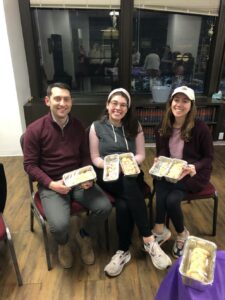
Chana Strauss is a board member at Mekor Habracha. From 2017-’20, she worked as a labor and delivery nurse at New York-Presbyterian Hospital. She thought she wanted to stay in New York City with her husband Steven. But then she entered a master’s program in midwifery at the University of Pennsylvania.
When the couple moved to Philadelphia, they started attending Shabbat services at Mekor Habracha. In a matter of weeks, they had a circle of friends. Everyone kept inviting them to Shabbat meals.
Strauss graduated in 2021 and got a job at AtlantiCare Regional Medical Center in Atlantic County, New Jersey. She still works there but lives in Center City and belongs to Mekor Habracha.
“We just don’t have any desire to leave,” Strauss said.
The shul operates like a Modern Orthodox institution, but it also takes progressive actions where it can, according to Strauss.
“As a female, I feel empowered to play a leading role,” she said.
Geller explained that Hirsch follows halachic principles. But when the scripture allows for interpretation, he interprets.
“One of the things that attracted me to it was that women can feel free to sing,” Geller said.
Hirsch does not want Judaism to feel inaccessible to young people, according to the treasurer. Instead, he wants to give them reasons to practice and join.
“People in this neck of the woods have so many secular opportunities. To provide an infrastructure that provides an ability to live an Orthodox life is kind of unique,” the rabbi said.
Mekor Habracha does not have many expenses, according to Geller. But rent is expensive in Center City, and synagogue members are allowed to pay what they can.
This forces the shul to operate on “a shoestring budget,” the treasurer said. Synagogue dues are $400 a year for a student, $750 for a single person and $1,500 for a couple/family. Some members contribute more than their dues. The synagogue also fundraises at times.
It works, according to Hirsch. But there is room to grow. The rabbi said the next step is building a school in Center City.
“We’d love to buy a building and have it be a social center, a learning center,” he said. “We can have an organization that’s a center for Jewish life in the city.”
“It would keep people from moving to the suburbs,” Geller added.
“It would be great to have in the long run,” said Strauss, who does not yet have kids.



